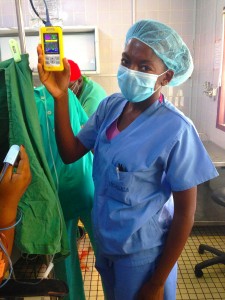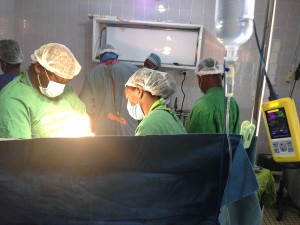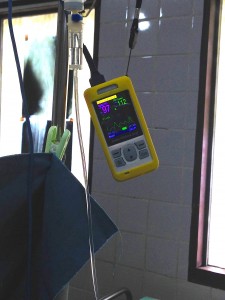Cameroon, diaspora and safer surgery
When it comes to making global surgery safer, where in the world do you start?
At home.
Diaspora communities are some of the most passionate and effective agents for safe surgery and anaesthesia we’ve met, with a connection and commitment to their country that powers long-term change.
Take Nelly-Ange Kontchou, a fourth-year student pursuing her MD/MBA at Harvard Medical School and Harvard Business School. Nelly-Ange hails from Cameroon and is primarily interested in advancing health equity through safer surgery globally. She’s worked with the Cameroon Professional Society (CPS) to raise awareness.
Nelly-Ange spoke to us about her drive to support Lifebox projects in Cameroon – and sent us some photos from her surgical rotation in Douala, with Lifebox oximeters in action!

I was so excited to see this Lifebox oximeter in use for the debridement of necrotizing fasciitis (deep skin and subcutaneous tissue infection) of the foot in a diabetic patient. The nurse anesthetists depend on it daily to assure themselves that their patient is stable or alternatively, to quickly move to intubate the patient in order to avoid respiratory failure.
“When I found out that Lifebox was taking on Cameroon as a country of focus for 2016, I knew I had to get involved. In my opinion, Cameroon’s health challenges and successes have received much less global attention than those of its neighbors with comparable socioeconomic profiles. Therefore I was extremely excited that this great organization wanted to shine a spotlight on my country.
I’m currently rotating through the General Surgery, Orthopedic Trauma, and Otolaryngology services at the Military Hospital of Douala. There is only one Lifebox pulse oximeter in use, and the nurse anesthetist who traveled twelve hours by road to receive it at the annual anesthesiology conference in Kumbo two years ago cannot overstate how badly more are needed.
Without a pulse oximeter, a patient under anesthesia could succumb to a low flow of oxygen to any of his or her vital organs, unbeknownst to the surgeon until irreversible damage has already been done. So, although they are simple pieces of equipment, pulse oximeters are vital to monitoring patients in any period of bodily stress – whether under the knife or battling an illness on the general medical or intensive care floors.
Lifebox is an organization that tackles the healthcare issues that I feel most strongly about: inadequate access to care, inequitable distribution of resources, low quality assurance, and suboptimal human resource management. Since 2011, Lifebox has striven to assess and meet the needs of resource-poor countries around the world by connecting anesthesiologists and surgeons with the pulse oximeters they need to perform safe surgery.

The hospital’s sole Lifebox oximeter in use for a below-the-knee amputation of an ascending gangrenous foot infection.
Working in the operating rooms here firsthand has simply reinforced both my commitment to safer surgery in Cameroon and my hope that all able and willing people might contribute what they can to deliver this much needed surgical equipment to the medical facilities that need them most.

The Lifebox oximeter was used again to fix a broken thigh bone with metal plates and screws in a middle-aged woman who was knocked off of a motorcycle. Unfortunately, this type of road traffic accident is far too common in Cameroon. The operation is called an open reduction and internal fixation of a femur fracture.

